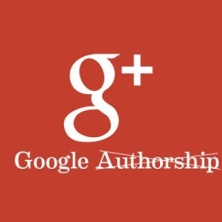Google drops the Authorship markup
2nd September, 2014

As you may or may not be aware Google Authorship has been regarded (up until last week) as a highly effective way of promoting ones content on search engine result pages (SERP). This free and supposedly easy to execute "markup" code provided our Google+ profiles with an authority to validate identity and establish a personal authorship.
On a simple level having an authorship meant that your image and tag-line appeared next to your content in the SERP's by displaying a snippet of info from your Google+ profile page, revealing your name, photo and the amount of Google+ circles you belong to.
This in turn created an easy way for Google to track and verify connections by identifying good quality content, created by real humans who are prepared to put their name and face to the articles they produce, all the while, helping to encourage worthy content and effectively crush spam like content.
Having a verified authorship also helped Google to clarify what your website and its content aims to deliver - in return Google proposed to reward those sites using an established authorship with richer listings and even an improved click through rate.
With our own new site in the finishing stages of its build and launch just around the corner, the implementation of this markup code into our own Google+ account was on our (ever expanding) SEO & content strategy list. That is, up until this morning.
It turns out that after three years Google has decided to drop Google Authorship and it seems there are a number of key reasons why they chose to withdraw it.
In brief, and to summarise from E-consultancy's expert panel article, those key reasons (to name just a few) were:
* A poor adoption rate by webmasters
* Google reached the point where it no longer needed the markup set up to identify the author or post
* Authorship represented on mobile search proved a challenge on a mobile interface and the image & additional info (where space is limited) may have potentially been distracting attention and therefore possibly having a negative impact on paid ad clicks.
Google's John Mueller stated back in June on his Google+ profile page that the decision to remove author photos was to "simplify the way authorship is shown in mobile and desktop search results"Authorship-example
He since stated last week "we've also observed that this information isn't as useful to our users as we'd hoped, and can even distract from those results".

And so naturally following this recent announcement opinions have intensified on the exact reasons why they eventually chose to pull the plug. If you are working on your own SEO strategy like us and want to learn more, then it is certainly worth taking the time to read a few of the links provided in this post.
According to Google the change will not affect anything on your site, only from now on, the markup code implemented will simply be ignored and as Danny Sullivan, founding editor Search Engine Land informs us Google Authorship may have died yet Author Rank lives on, stating "Google is likely to look for visible bylines that often appear on news stories. These existed before Google Authorship, and they aren't going away" and it seems that even if you have taken the time to integrate the markup in your pages, your time may not have been wasted as "such markup might be used by other companies and services".








Comments
comments powered by Disqus